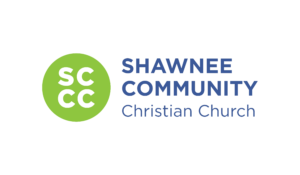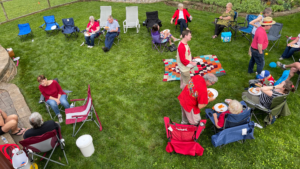a little r & r

Last week I visited with you about Pentecost as the birthday of the church when the Holy Spirit descended like Tongues of Fire and a Heavenly Dove (or as a Wild Goose—as Celtic Christianity would have it) upon the grieving disciples. I mentioned how uncomfortable we Protestants and members of a Christian Church (Disciples of Christ) congregation like ours at Shawnee Community Christian Church are with delving into spirituality related to Pentecost..
I said we’re good with talking about and with God, our Creator and First Person of the Trinity, and about and with Jesus, the Son of God and Second Person of the Trinity, but not so comfortable talking about and with the Holy Spirit, the Third Person of the Trinity.
This week I want to lift up the importance of understanding the church as primarily a spirit-filled community rather than just another organization or formal institution in our society, because spirituality infuses all of life, not just our individual pursuit of wholeness.
More times than I can count I have heard people both inside and outside the church refer to churches as just a part of “organized religion.” They do not mean this as a compliment.
My first response is to retort, playfully, “Then you’d feel right at home in my church. We’re very disorganized.” I’m lucky if this elicits even a slightly upturned smile.
My second response is to chalk their anti-church comment up to the anti-institutional regard in which all institutions in American society (and elsewhere) are held these days. Schools, infrastructure, government, science, marriage and family are all hurting. It should come as no surprise that churches have also felt this anti-organizational, anti-institutional pinch.
The thing is: from scripture’s point of view, the church is first and foremost a spiritual body, and only then an organization. The Greek word for church, ecclesia, means quite literally, “the quality (ia) of being called (cles) out (ec/ek). The apostle Paul reinforces this spiritual understanding of the meaning of church when he speaks of it as “The Body of Christ.” Paul’s terminology is organic in nature, not mechanical, not formal, not organizational, not institutional at all! It is dynamic, intuitive, though not irrational.
The development of the church as an institution would not begin to develop until some 60 years after Paul wrote his letters to the various Mediterranean congregations. Talk of bishops, elders, deacons, and so on would not unfold until the turn of the second century C.E. with the later pastoral epistles of 1 & 2 Peter and Jude. Yet even then churches were first understood as spiritual bodies, not formal organizations with buildings, budgets & by-laws. So, when the Greek New Testament refers to churches as ekklesia, from which we get our word ecclesiastical, it’s referring to church as a verb, as an active, moving, dynamic movement for proclaiming God’s will in the world in the Name of Jesus Christ.
Trouble is: All of us, including us clergy, have given in to the seductive influence of economic, political, medical, psychological and athletic narratives for defining our lives and our world, we only see church as just another organization competing for our time, talent and treasure. We do not interpret the church biblically and theologically, but only organizationally and pragmatically. At worst, we demand of the church what we demand of all institutions listed above: “What have you done for me lately?” We live and often practice a very commercial, market-oriented understanding of what the church is supposed to be and to do.
The Spirit of Pentecost, like Tongues of Fire and a Wild Goose or a Heavenly Dove, is counter-cultural to this more highly secularized, materialistic way of defining church. Pentecost asks and keeps asking the question whether the Spirit of Christ burns within our hearts? The Spirit that came to the disciples and those who had gathered from near and far says,
In the last days, God says,
I will pour out my Spirit on all people.
Your sons and daughters will prophesy.
Your young will see visions.
Your elders will dream dreams.
Even upon my servants, men and women,
I will pour out my Spirit in those days,
and they will prophesy.
This is a Spirit, as Acts 2 continues, which has the power to alter the cosmos and to birth a new heaven and a new earth. It is a Spirit that disregards age, gender, class, or any other human distinction in order to alter fundamentally the way we experience and understand our world.
No longer will believers settle on safety-assuring traditions (“We’ve always done it this way”) or unconsciously assumed ways of thinking (“But I always thought”). The Holy Spirit is a wild thing that engenders new creation in us, in the church, and in the world. It does not simmer. It bubbles up and boils over, sometimes even making a mess of things we’d prefer to remain tidy.
Well, next time you catch yourself or someone else saying, “I don’t believe in church. I don’t believe in organized religion,” I hope you’ll understand they (we) have mistaken the word church, “ecclesia,” as a noun, not a verb.
And when those precious, few moments occur when we feel something burning inside our mind and heart (in the 1st century they were the same thing), calling us to become more than we ever thought we could be, we need ro tell God “Thank you!” It means we’ve caught the breath of the fiery wind of the Holy Spirit. More importantly, it means the Spirit of God has caught us. It means we too may now find ourselves seeing visions and dreaming dreams of the new world God yearns for through this magnificent, living Body of Christ, the church.
May it be so, Lord! And may it be so sooner than later!
Rick








